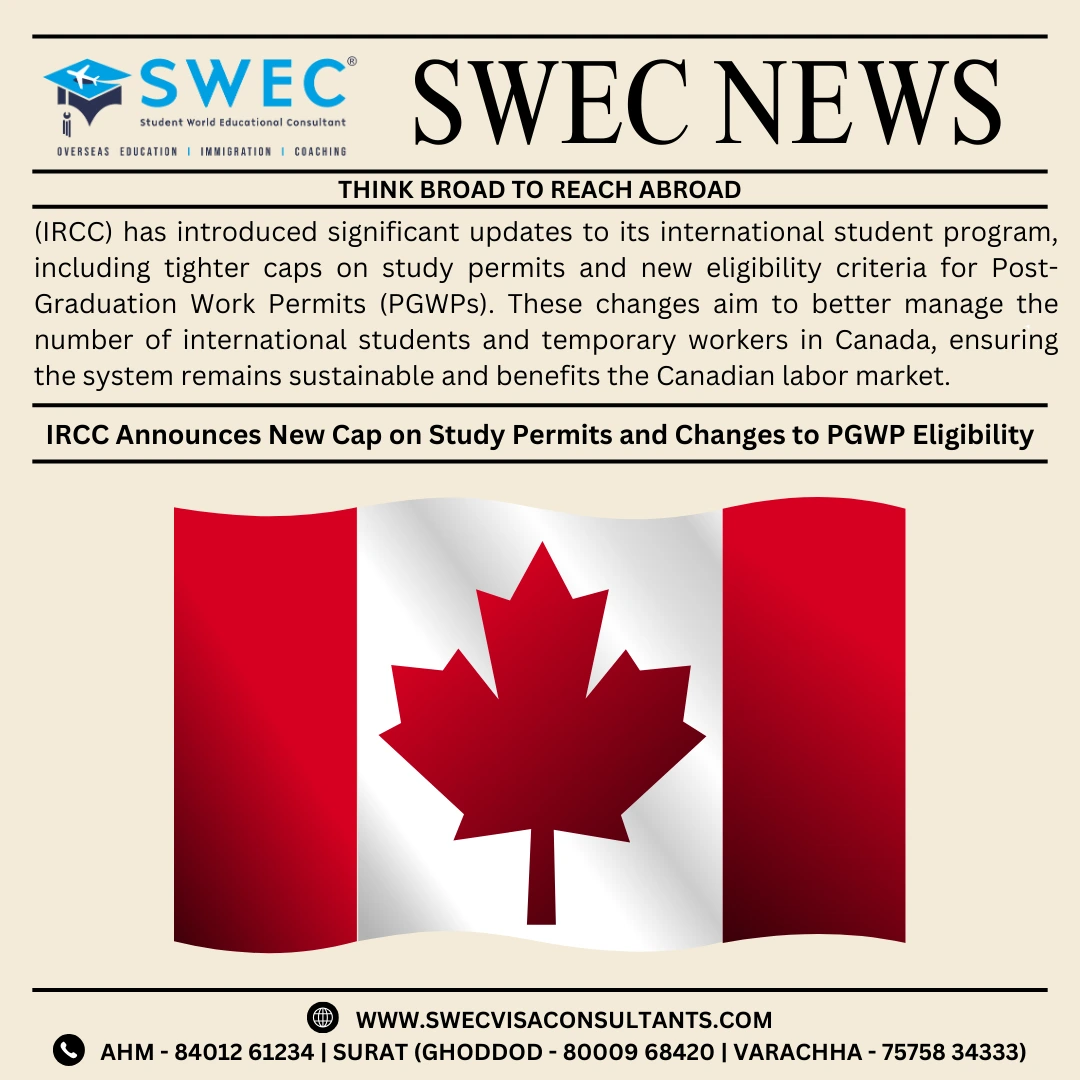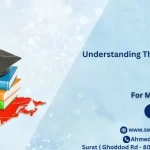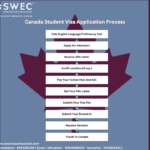Table of Contents
Brief on New Cap on Study Permits and Changes to PGWP Eligibility
Canada’s Immigration, Refugees, and Citizenship Canada (IRCC) has introduced significant updates to its international student program, including tighter caps on study permits and new eligibility criteria for Post-Graduation Work Permits (PGWPs). These changes aim to better manage the number of international students and temporary workers in Canada, ensuring the system remains sustainable and benefits the Canadian labor market.
Study Permit Cap: A New Limit for International Students
Canada’s Immigration Minister, Marc Miller, announced that IRCC will be capping the number of study permits issued starting in 2025. Here’s what you need to know:
- 2025 Study Permit Cap: IRCC will issue a maximum of 437,000 study permits in 2025.
- Reason for the Cap: This number reflects a 10% reduction from the target of 485,000 permits set for 2024.
- Impact: Over the next few years, this cap is expected to reduce the number of study permits issued by 300,000.
Provincial Attestation Letter (PAL) Now Required for Master’s and PhD Students
One of the most significant changes is that master’s and PhD students will now be included in the study permit cap.
- PAL Requirement: These students will be required to obtain a Provincial Attestation Letter (PAL), which was previously introduced for undergraduate and college students.
- Why the Change?: The PAL system helps verify the authenticity of student applications and stabilize the number of study permits.
- Reserved Spaces: 12% of the available study permit spots will be reserved for master’s and PhD students, acknowledging their contributions to the Canadian workforce.
Changes to Post-Graduation Work Permit (PGWP) Eligibility
IRCC has also tightened the eligibility criteria for the Post-Graduation Work Permit (PGWP), a key pathway for international students seeking work opportunities in Canada after completing their studies.
- New Language Requirements:
- University graduates will need to achieve a Canadian Language Benchmark (CLB) score of 7.
- College graduates will need a CLB score of 5.
- Start Date: These new requirements will apply to students applying for PGWPs after November 1, 2024.
- Impact: These changes are expected to reduce the number of PGWPs issued by 175,000 over the next three years.
Limits on Spousal Open Work Permits
IRCC is also making changes to the Spousal Open Work Permit program, which allows spouses of international students to work in Canada.
- Who Is Affected?: The new restrictions will limit work permit eligibility to spouses of master’s degree students enrolled in programs lasting at least 16 months.
- Expected Impact: This change is projected to result in 50,000 fewer spousal work permits being issued over the next three years.
- Additional Changes: Outside of the student program, spousal work permits will be limited to the spouses of Canadian citizens or permanent residents working in critical sectors.
Impact on Temporary Foreign Worker Program (TFWP)
The new measures will also affect the Temporary Foreign Worker Program (TFWP), which allows employers to hire foreign workers to fill labor shortages.
- Rising Unemployment: Canada’s unemployment rate increased from 6.4% to 6.6% between April and August 2024, with 1.5 million people unemployed in August alone.
- Government’s Approach: Minister of Employment, Randy Boissonnault, emphasized that the TFWP should be used only as a last resort and must not replace Canadian workers or suppress wages.
- Economic Growth: Despite these changes, immigration remains essential for Canada’s economy, with 99% of economic growth currently dependent on immigration, expected to rise to 100% by 2032.
Temporary and Permanent Residency Reforms
2024 has been a year of major overhauls in Canada’s immigration system, with new policies introduced to manage both temporary and permanent residents:
- Cap on Study Permits: Introduced as a temporary policy in January 2024, this cap will remain until the end of 2025.
- PGWP Restrictions: Students in college programs with curriculum licensing agreements are now ineligible for PGWPs, further tightening access to the program.
- Spousal Work Permits: Eligibility is now restricted to spouses of students in master’s and PhD programs, with limited exceptions.
- Temporary Resident Levels: For the first time, IRCC will include temporary resident levels in its 2025-2027 Immigration Levels Plan.
Additional Steps to Reduce Temporary Residents
Canada has introduced several measures to reduce the number of temporary residents:
- End of COVID-era Policy: Visitors can no longer apply for a job-supported work permit from inside Canada, a policy that was previously allowed during the COVID-19 pandemic.
- LMIA Pause: IRCC has paused the processing of Labour Market Impact Assessments (LMIAs) for low-wage jobs in regions with an unemployment rate of 6% or higher.
- PGWP Tie-In to In-Demand Sectors: The government is considering significant changes to PGWP eligibility, linking the issuance of these work permits to programs that prepare graduates for work in in-demand sectors.
Looking Ahead: Permanent Residency Changes?
Minister Marc Miller hinted at more substantial changes to permanent immigration levels in the near future. While the focus is currently on reducing temporary residents, the government is carefully evaluating whether permanent immigration levels also need adjustments.
- What’s Next?: Miller emphasized that any changes will be significant and not just cosmetic. More details are expected soon.
Conclusion: Preparing for the Future
With these new caps and eligibility changes, Canada is taking steps to control the influx of international students and temporary workers, focusing on sustainability and labor market alignment. As Canada’s immigration landscape continues to evolve, it is essential for prospective students and workers to stay updated and adjust their plans accordingly.
Key Takeaway: The new caps on study permits and stricter PGWP eligibility criteria represent a significant shift in Canada’s immigration policy. For international students and workers, it’s important to understand these changes and take steps to ensure compliance. Consult SWEC’s professional visa and immigration experts for personalized guidance on navigating these evolving requirements and achieving your Canadian immigration goals.





